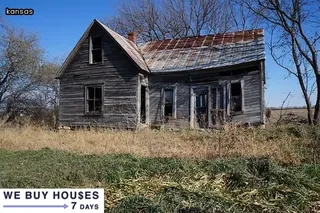Probate is the legal process of administering a deceased person's estate. It involves identifying and collecting the deceased person's assets, paying off any debts or tax liabilities, and distributing the remaining assets to the appropriate beneficiaries or heirs.
In Kansas, probate is generally required if the deceased owned real estate in their own name at the time of death. If there is no Will, then an Administrator is appointed by a court to carry out a probate proceeding.
The Administrator has several duties including collecting assets, locating creditors, paying taxes and other debts, and distributing property to heirs according to Kansas law. During this process all parties involved have certain rights and responsibilities that must be followed.
A probate court must approve all transactions related to the administration of the estate such as sale or transfer of real estate. The process can take anywhere from six months up to two years depending on the complexity of the estate and how quickly creditors can be identified and contacted for payment.

Being the executor of a Kansas estate can be a daunting task, especially if you’re unfamiliar with the probate and real estate laws. It’s important to know your duties and responsibilities as an executor in order to ensure that everything is handled correctly and efficiently.
In Kansas, the executor of an estate is responsible for gathering all assets belonging to the deceased; properly notifying creditors, tax agencies, and beneficiaries; settling any debts or taxes due on the estate; filing necessary legal documents; distributing assets according to the terms of the will or intestate law; keeping detailed records of all transactions; and providing regular accountings of all activities associated with the estate. As an executor in Kansas, you must also obtain court approval before selling or transferring real property owned by the deceased.
Additionally, before closing out an estate you are required to file a final accounting of all transactions with the court. Executors in Kansas should consult with an attorney familiar with local probate and real estate laws to ensure that all proceedings are conducted properly.
In Kansas, probate can be a lengthy and costly process, but there are some options available to you if you want to avoid it. One of the most common ways is for the estate owner to create a revocable living trust.
This trust allows an individual to transfer assets into the trust during their lifetime and name a beneficiary or beneficiaries who will inherit the assets upon their death. Another option is joint tenancy with right of survivorship, which allows unmarried couples to own real estate together and ensures that when one dies, the other automatically inherits the entire property without having to go through probate.
A third option is for an individual to designate a payable-on-death (POD) beneficiary on bank accounts or other financial instruments. The POD beneficiary will receive all funds in these accounts after the death of the account holder without requiring any probate proceedings.
Finally, transferring ownership of real estate by using a deed with transfer-on-death provisions can also help avoid probate in Kansas. By using one or more of these methods, individuals can ensure their assets pass quickly and easily to their heirs without going through probate court.

In Kansas, the executor of an estate is responsible for carrying out the instructions of the deceased's Last Will and Testament. As compensation for their work, they are allowed to collect reasonable fees determined by the Court in accordance with Kansas law.
The amount that can be collected is based on a percentage of the value of the estate and may include expenses such as legal fees and court costs. In order to receive compensation, a request must be submitted in writing to Probate Court which will review all documents related to the estate and determine what fees are appropriate.
Real estate transactions are also subject to probate laws in Kansas which require any transfer of property from one person to another to go through a process known as probate administration. This includes determining who has legal title to the property, paying outstanding debts or taxes owed on it, distributing assets according to state law, and providing notice to all interested parties.
Executors may also be required to handle real estate transfers in accordance with Kansas laws if they are included in the Last Will and Testament of a deceased individual.
When an executor is settling an estate in Kansas, they need to be aware of the timeline for probate and real estate in the state. In general, the process of probating a will and distributing assets in Kansas can take anywhere from six months to two years, depending on the complexity of the estate.
After filing any necessary paperwork with the court, including a petition for probate and an inventory of assets, it typically takes 30-60 days for the court to issue Letters Testamentary which allows the executor to carry out their duties. From there, creditors must be paid within 90 days after receiving notification from the executor that they are entitled to payment from the estate.
Real property must also be appraised and distributed within this same timeframe. Once all debts have been paid off and property has been distributed as outlined in the will or trust documents, then an Order of Distribution will be issued by the court that releases all interests in any remaining assets of the estate.
At this point, some estates may close quickly while others may take several months or even a year or more to complete if further issues arise during settlement.

In order to file a will with the court in Kansas, certain requirements must be met. First, the testator must be at least 18 years old and of sound mind.
The will must also be signed by two witnesses or notarized, although it is recommended that both conditions are met. Additionally, the will should be written out in detail and contain all relevant information regarding the testator's wishes.
Furthermore, if there are any specific instructions regarding real estate or probate issues, they should be included as well. If all of these requirements are fulfilled, then the will can be filed with the court in Kansas.
When settling an estate without going through probate in Kansas, there are some important things to consider. One of the most important is understanding how to transfer real estate and other assets.
Generally, if the deceased had a will and all of their debts were paid prior to death, then transferring real estate can be done by executing an affidavit of heirship or a deed of distribution. This document must be filed with the county clerk's office and is typically used for transferring real estate when there is no will or when all heirs agree to the transfer.
Other assets such as bank accounts, retirement accounts, life insurance policies, and investments may also be transferred without probate by assigning them directly to the beneficiary listed on each account or policy. It is important to contact each financial institution or company that holds these assets in order to ensure that they are properly transferred after death.
Finally, it is wise to consult with an experienced attorney who specializes in estate planning in Kansas if you have any questions or need assistance with making sure your loved one's estate is properly settled without probate.

In the state of Kansas, calculating the time periods involved with filing probate after a death is an important step to understand. The process begins when the court officially appoints an executor or administrator of the estate.
This person is responsible for notifying creditors and heirs, collecting assets, and paying off debts. Once this is done, the executor can file a petition with the district court in the county where the deceased last resided.
The length of time for probate will vary depending on how complicated the estate is and whether any disputes arise. After all debts have been paid, assets are distributed according to state law as well as any instructions laid out in a valid will.
If there is no will, then assets are distributed according to intestacy laws which differ from state to state. Any real estate owned by the deceased must go through a separate process known as ancillary administration which occurs outside of probate and requires that documents like deeds be filed with local officials so legal title can pass on to rightful heirs.
Understanding the probate process in Kansas can be a complex endeavor, particularly when it comes to real estate. Probate is the legal process of administering and distributing an individual's estate after they pass away.
In Kansas, probate court will oversee the administration of the deceased's assets, including any real estate owned. To open a probate case, an executor must be appointed by the court to gather all relevant documents and identify heirs and beneficiaries of the deceased's estate.
All beneficiaries must be notified of their rights in regards to their inherited property before the probate process can proceed further. The executor must also file an inventory of all assets with the court, along with accounting information regarding those assets and debts that have been paid out from them.
Once these steps are complete, a judge will determine how much each heir or beneficiary should receive from their inheritance. In many cases, this includes some form of real estate ownership or benefit such as rental income from a property owned by the deceased person.
In addition, specific laws in Kansas may apply to certain types of real estate transactions during probate proceedings that could affect how those properties are divided among family members or other parties involved in the case. It is important for anyone involved in a probate proceeding in Kansas to understand these laws before proceeding with any transaction involving real estate belonging to someone who has passed away.

The Kansas Probate Code is an important part of understanding the process of probate and real estate when it comes to legal matters in Kansas. Probate is a court-supervised process for settling estates, including the distribution of a deceased person's assets and debts.
In Kansas, the probate court oversees the administration of estates, conservatorships, guardianships, trusts, adoptions and other matters related to probate law. The Kansas Probate Code outlines all the details regarding these proceedings and how they are handled in the state.
It also covers issues related to real estate such as mortgages, taxes, liens and title searches. Additionally, it sets out rules for determining who inherits property when someone dies without leaving a will or trust agreement.
Knowing the specifics of the Kansas Probate Code can help ensure that probate and real estate transactions are handled correctly and efficiently according to state law.
In Kansas, probate is a legal process that must be followed when someone passes away. The individual who has passed away is known as the decedent and their estate includes all of the property, assets, and debts they had at the time of their death.
Every estate must go through probate according to Kansas law. This is true even if the decedent created a will before they died.
Probate requires that all of the decedent’s assets are gathered together and appraised in order to determine their value. Any debts owed by the decedent must also be settled during this process so that their remaining estate can be distributed among any heirs or beneficiaries listed in the will.
Real estate transfers typically involve additional paperwork and procedures that must be completed during probate for them to become final. In some cases, real estate may have to go through a court-supervised sale in order to settle an estate.
The laws surrounding probate and real estate in Kansas can be complicated, but they are important to understand if you want to ensure your wishes are carried out after you pass away.

The administration of an estate is a complex process that requires the involvement of multiple parties. The executor or personal representative of the estate, typically named in the decedent's will, is responsible for overseeing and managing the entire process.
This individual is responsible for filing all necessary paperwork with the local court, notifying creditors and beneficiaries of the estate, gathering assets, paying debts and taxes due from the deceased, and ensuring that any remaining assets are distributed to appropriate heirs. Depending on state law, an attorney may be required to assist with certain aspects of the administration process.
In Kansas, it's important to understand both probate law and real estate law as these areas can heavily impact how an estate or trust is administered. Ultimately, it's up to the executor or personal representative to ensure that all legal requirements are met so that assets are properly distributed as intended by the decedent.
When dealing with the probate process, there are several key steps that must be taken in order to achieve a successful outcome. First, you will need to determine who is responsible for administering the estate.
This is typically done through the appointment of an executor or administrator. After this has been established, it is important to collect all relevant information about the deceased and their estate, such as assets and liabilities, including real estate in Kansas.
You will then need to obtain a death certificate and open probate with the court. Next, you will have to identify any creditors and notify them of their right to file a claim against the estate as well as paying bills associated with the estate.
It is also important to complete an inventory of all assets and liabilities within the estate as part of the probate process. Finally, once all debts have been cleared, you can distribute remaining assets according to state laws or per instructions provided in a will or trust document.
Understanding these steps and properly following them is essential for ensuring a successful probate experience.
Yes, a house must go through the probate process in Kansas if the deceased person owned it. Probate is the legal procedure for transferring property from a deceased person’s estate to their beneficiaries.
In Kansas, real estate must go through probate regardless of whether the deceased left behind a will or not. The court will appoint an executor to oversee the process and handle all paperwork associated with probate.
During this process, creditors are paid off, taxes are collected and any remaining assets are distributed to beneficiaries as indicated in the will or according to state law. It’s important to note that probate can be time consuming and expensive so it may be beneficial to look into other options such as joint tenancy or living trusts that can avoid probate in some cases.
Ultimately, if you are looking to buy or sell real estate in Kansas, understanding how probate works is essential.

Yes, you can sell a house that is in probate in Kansas. Probate is the legal process of transferring property ownership from a deceased person to their heirs and beneficiaries.
In order to sell a house that is in probate, you must first obtain court approval from the appropriate court with jurisdiction over the estate. The executor or administrator of the estate will need to file a petition with the court and provide proof of authority to act on behalf of the estate.
Once approved, the executor can list the property for sale with a real estate agent and begin accepting offers from interested buyers. It's important to note that due to certain restrictions imposed by state laws, it can take more time for an estate in probate to be sold than for other types of real estate transactions.
Additionally, when selling a home that is still in probate, it's necessary to hire an attorney who specializes in real estate law and probate law so they can ensure a smooth transaction.
If you own real estate in Kansas, there are several ways to avoid having to go through probate court. The best way is to create a living trust.
Living trusts allow you to legally transfer assets of any kind into the trust, and then designate a trustee who will manage and distribute the assets upon your death. Additionally, joint tenancy allows two or more people to hold title to property.
When one owner passes away, the other automatically becomes the sole owner without going through probate court. Another option is transferring property into a payable-on-death (POD) account or an individual retirement account (IRA).
A POD account allows you to transfer ownership of bank accounts and other financial instruments without involving probate court. IRAs can be used for real estate transactions as well, allowing for the transfer of ownership without the need for probate proceedings.
Lastly, gifting property during your lifetime can help avoid probate in Kansas; however, it’s important that all necessary paperwork is done correctly in order for this method to be successful.
Probate is the legal process of administering the estate of a deceased person in Kansas. It involves collecting and managing assets, paying any taxes or debts that are owed, and distributing remaining assets to heirs or beneficiaries.
In order to begin the probate process, an executor must be appointed by a court. This person is responsible for handling all aspects of the estate and ensuring that all debts are paid and assets are distributed according to the deceased’s wishes as stated in their will.
The executor also needs to obtain appraisals of real estate property within the estate so that it can be properly valued and divided among heirs or beneficiaries. Probate can take anywhere from several months to over a year depending on the complexity of the estate and other factors such as litigation or disputes between heirs or creditors.
Real Estate in Kansas is subject to certain rules regarding transfer of ownership after death, including filing required notices with a court in order for title transfer to occur. For these reasons, it is important for individuals in Kansas who own real estate property to have an up-to-date will that outlines their wishes for how their assets should be managed after death.